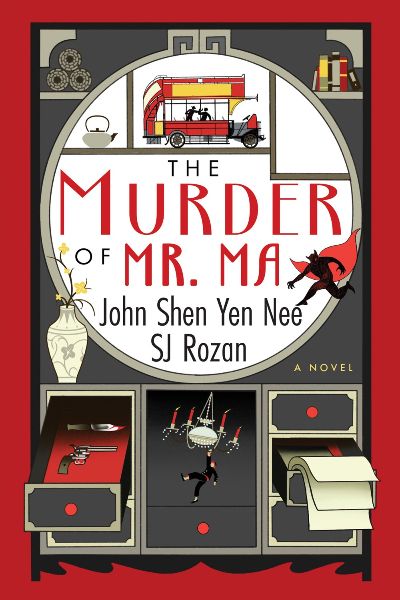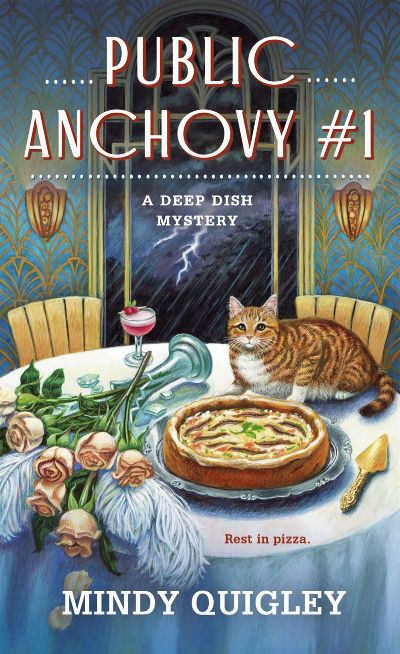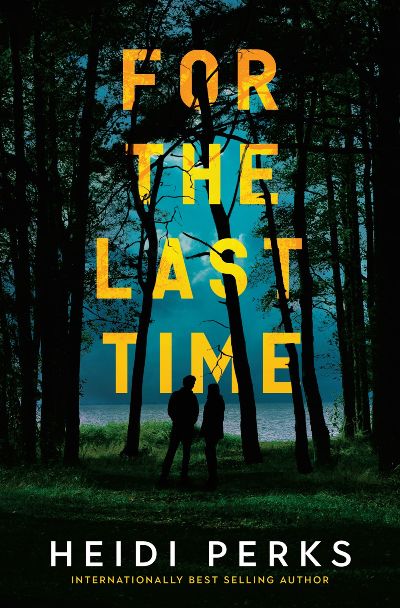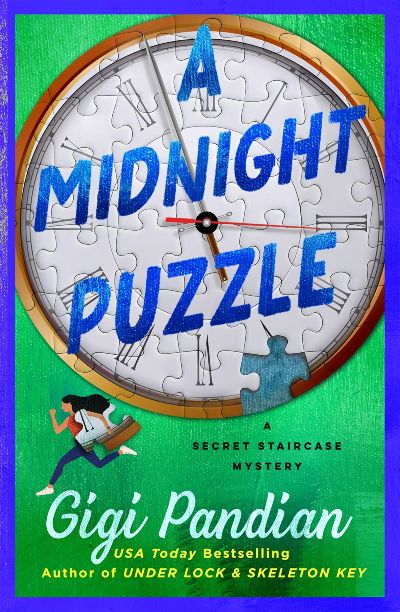Cort Gentry, the Gray Man; and his girlfriend, Zoya Zakharova, have assumed new identities while trying to live off the grid for a few months. But they can only hide for so long. A colleague of Zoya’s arrives in the Central American town where Cort and Zoya felt safe and asks her help in rescuing a Russian scientist who is one of several engineers and computer experts with targets on their backs. Shortly after the meeting, Cort and Zoya must flee to avoid the weaponized drones and army of killers sent to take them out. One of those soldiers has a past with Cort and a reputation of being as good an assassin as Cort was in his prime. The mayhem grows in intensity as the truth unveils itself; a mystery controller named Cyrus calls all the shots and does not care about any collateral damage. Greaney combines the best of special-ops novels with a dash of James Bond, and though the page length is significant, the story never bores or lags. The Chaos Agent is another winner, and whether you are a fan or new to the Gray Man, this is a blast (no pun intended).
Review
A high-energy, rambunctious tale that shares much with Sherlock Holmes—the Guy Ritchie versions, that is—as well as traditional Chinese gong’an crime fiction, in which government magistrates solve criminal cases. It’s London, 1924 and Judge Dee Ren Jie, known as Judge Dee, has just arrived in the country to investigate the murder of a colleague whom he knew during World War I, when both served with the Chinese Labour Corps. No less a personage than Bertrand Russell introduces the Judge to Lao She, a retiring London academic who quickly becomes Dee’s sidekick—they are introduced in a prison breakout, it’s complicated—and the two set off to locate the victim’s family. One murder soon becomes two, then more, all performed with the distinctive butterfly sword, putting yet more pressure on Judge Dee to find the perpetrator before he or she tries to murder him. The authors do a wonderful job of depicting the bustling London of the ‘20s, the Chinese community and the relentless racism and stereotypes it is a victim of, and absolutely fabulous displays of martial arts. There’s word that Dr. Dee may be returning to solve another case; here’s hoping he does!
Delilah and the crew from her restaurant, the upscale pizzeria Delilah & Son (Son is short for Sonya, Delilah’s best friend and sous chef), are at Bluff Point, an opulent, old mansion on Wisconsin’s Geneva Bay. They’re catering the Friends of the Library’s fundraising gala—an opportunity to show off their skills and bolster the declining winter business—and the menu does look fantastic. Too bad that the guests hardly get to sample anything more than the appetizers when Edgar Clemmons, outgoing board chair—and quite bitter about his departure—falls down the staircase, landing at the bottom like a broken marionette. Murder or accident? It’s hard to say, since Edgar shared a number of vague secrets with several people before he took his tumble. The man’s demise sends many scurrying home, although a powerful storm has moved in—downed trees, exposed power lines—prohibiting law enforcement from reaching Bluff Point and keeping a dozen or so attendees, including Delilah and her staff, in the mansion for the night. Here the mystery morphs into a closed circle, with an assemblage that includes Delilah’s crush, police detective Calvin Capone; and Butterball, her cat, who takes on quite the active role in this title. As with the other books in the series, Quigley balances wonderful character development and plenty of low-key humor with the search for a killer. It’s hard to imagine a cozy fan who wouldn’t find this book to be a total delight.
Passing a daycare that’s engulfed in flames, Ashley Driskell risks her life to save several children. During an emotional reunion in the hospital, her husband, Luke, lets her know that someone took a video of her heroics and she’s now the darling of the Internet. Luke knows this won’t make Ashley happy, as she’s very private and dislikes even having her photo taken. Still, he’s surprised at Ashley’s vehemence that he must go, NOW, and pick up her daughter Joy, who is his stepdaughter, from the babysitter. Things become even stranger when the next morning Luke wakes to find that Joy is gone from their home and Ashley is missing from the hospital. Luke uses his desperation and sharp research skills to engrossing effect, digging deeper and deeper into the twisting mystery that is Ashley’s life. You won’t see the answers coming here, nor the satisfying ending; the love, loyalty, and determination shown by Luke are bonuses. A great read, especially for fans of D.J. Palmer’s My Wife is Missing.
At first, this novel seems to be a predictable, mildly entertaining thriller. Erin and Will take themselves off to marriage counseling because something has gone wrong, at least for Erin, who is suddenly putting her husband at arm’s length. But what’s the source of the problem? Even their counselor, Maggie, becomes consumed trying to understand what has gone awry in their marriage, especially when Will is, annoyingly, nearly the perfect man. Then, out of nowhere, Perks drops a clue that made my head spin, cranks up the narrative’s pace, and pulls us deeper into the disturbing past of Erin and Maggie. Since this is from multiple perspectives, and jumps skillfully around the narrative time-line, readers will have fun trying to put this complex, fractured and totally compelling story together. A perfect read for fans of Lisa Jewell and B.A. Paris.
Bridget Jones meets Thursday Murder Club in this tale of rural English women who meet in a prenatal class and learn far more than how to not kill your partner while the baby’s making its debut. The central character and narrator is Alice, who, she tells us, thought she’d surprise her boyfriend for his 30th birthday with a pregnancy. It’s a happy if slightly puzzling surprise, as Alice has little idea how to care for a baby and she’s terrified of birth. The overly chipper and hippy teacher of the class, whose clothes resemble “a chameleon caught in a kaleidoscope,” isn’t much help. Even less helpful is that one of the students gives birth during the class (would a first baby be that fast? Eh, it’s Bridget Jones with a baby. Moving on). And after that, the owner of the store downstairs from the class is found very dead. The rest of the class is still pregnant and they spend their time lumbering around the “posh hippy” town of Penton (“Population: seventeen people and a cow”) puzzling out village relationships, past scandals, and the intricacies of cloth diapers. This fun romp offers hilarious moments while taking on some real-life issues: the fear involved in becoming a first-time parent and the shadows of one’s own upbringing that can darken parenthood, all while Alice and friends undertake the whodunit. Ailes’s sequel, the perfectly named Dead Tired, meets the characters again after they’ve had their babies and will be out on the heels of this one, on June 4, 2024.
Tempest Raj, a former magician, now runs Secret Staircase Construction, which, among other things, creates elaborate hidden passages behind bookcases. The more complex and baffling the construction the better. One of the company’s jobs is scrutinized when a woman falls down a secret staircase and almost dies. Tempest knows that the victim’s husband, Julian, set up the fall so he could sue Tempest’s company and avoid liability. One night, Julian calls Tempest to visit him at the historic Whispering Creek Theater, a venue recently purchased and upgraded by Tempest. She arrives to find Julian dead, with a sword through his chest. When a paramedic stumbles upon another blade that pops out one of the entrance doors, Tempest realizes the theater has been set with booby traps. Demanding answers, especially since the clues lead to questions about her past, Tempest will risk everything for the truth. Pandian creates a cast of characters that is straight out of the best cozy mysteries, and even though this is the third book in the series, the story is a perfect launch point for newcomers. The pacing and writing elevate A Midnight Puzzle to a must-read for the cozy mystery fan.
2019 bookends this murder mystery. In that year, student KC, a trans man, is the weary caretaker of a college dorm, picking up after his lazy peers and saving them from their drunken worst selves. The dorm he works in has a rumor-clad oddity: a young female student was killed there years ago, and the true-crime frenzy has made the building a magnet for professional and amateur sleuths. Their work sends us back to just before New Years Eve 1999, where we meet the victim, Karlie Richards. Karlie seems to have it all but, like everyone she meets, has dragged a weight of hopes, loves, and past mistakes to her new life in college. It’s the pre-#MeToo era as Karlie faces what turns out to be her final days, and readers will love to hate the professor who has a way too close relationship to his female students, and long to jump into the pages to warn the young women away. But there’s nothing we can do as Karlie’s doomed world comes to life and Pearson skillfully introduces several more characters who could have killed Karlie and more reasons why they would have done so. The divergent lives of the haves and have nots in college towns, and the experiences of evangelical students taking their first foray into a more secular world, are starkly painted in this dark debut novel by an author to watch.
A tale both churlish and charming, in which Shelley House, a grand but dilapidated old mansion, is scheduled for demolition, forcing the residents to put aside their antagonism and fight the common enemy: the construction developer. Twenty-five year old Kat, of pink hair and punkish demeanor, has just rented a room in Shelley House and found a job as a dishwasher, convinced she’ll stay for just a couple of weeks. Why is she in town? It’s hard to say, except she partially grew up here with her loving grandfather, away from her substance-abusing mother, and something is drawing her back. Across the floor lives seventy-seven-year-old Dorothy Darling, a retired teacher who spends her days like Dickens’s Madame Defarge, recording the goings on of her neighbors. Both Kat and Dorothy are propelled by powerful secrets that stretch back years, and that only now—thanks to the corrupt cops and a vicious construction developer—they must expose to the light of day. With poignant characters and a richly drawn community, this is a novel readers will not soon forget.
This debut novel should come with blood-pressure pills. The tension at first comes from strangeness: Mother; Father; their daughter, Juno; and son, Boy live a harsh, homesteading life alone on an island. Is it the present day? What part of the world are they in? Is the mortal danger from outsiders that the parents warn about real? The timing element is all that’s clear for a good portion of the book: it’s the current day, but apart from visits from the mailman who comes from the mainland, during which Juno and Boy must hide from view, the rest is unknown. Bit by bit, teen Juno’s desire for freedom and her determination to find out more about their situation despite her sinister, violent parents’ “seven commandments” (including “We must always kill quickly and painlessly”) ramp up the fear to a terrifying do-or-die scene. Readers will be rapt as they race to the end to find out who survives this nightmare that’s effectively mixed with a fairytale motif echoing one of Juno’s favorite stories. Menger’s previous work is in film, TV, and audiobooks: try his Audible Originals Monster 1983 and Ghostbox while you wait for this gripping thriller.










